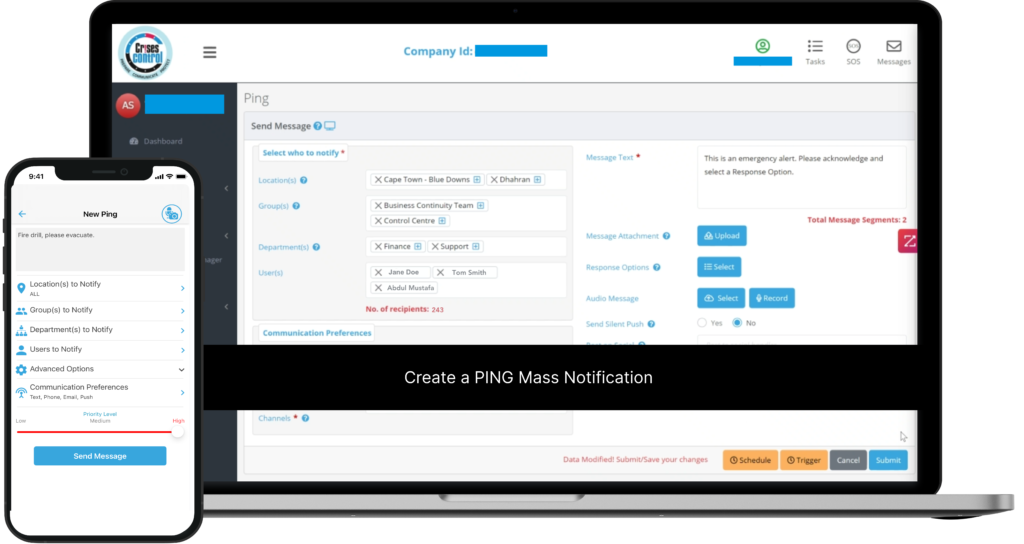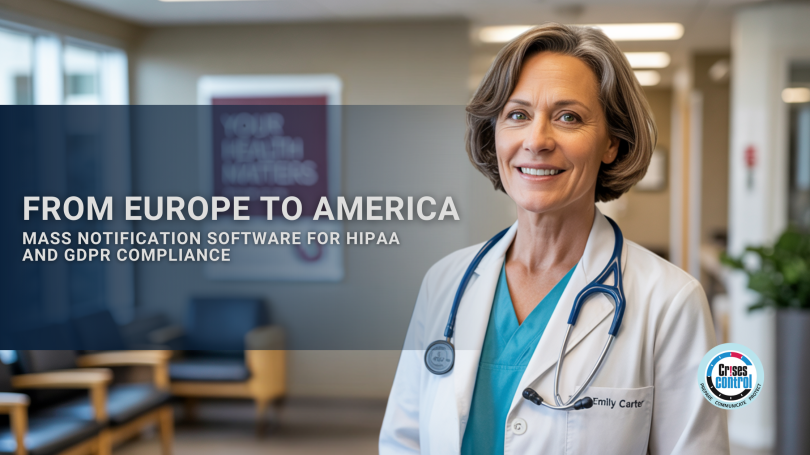Written by Anneri Fourie | Crises Control Executive
Introduction – The Problem and the Solution
Imagine this. A hospital’s IT systems go down during a cyberattack. Emergency surgery schedules need to be re-routed, patients moved to other facilities, and hundreds of staff informed about new safety procedures. The situation is urgent. A single wrong move in the way these messages are sent could expose patient data, triggering a serious breach of healthcare privacy laws.
This is not an imaginary risk. Healthcare organisations around the world face similar scenarios every year, and when communication fails, the cost is more than disruption. It can lead to massive fines, loss of trust, and legal battles that drag on for years.
The two most important frameworks governing healthcare data privacy are HIPAA in the United States and GDPR in the European Union. Both set strict rules for how sensitive health information can be stored, transmitted, and accessed. When an emergency hits, these rules still apply. That is why having the right systems in place before a crisis is critical.
Mass Notification Software that is built for healthcare use can solve this problem. It allows hospitals, clinics, and care providers to send urgent messages to the right people at the right time, while automatically protecting sensitive data and staying within legal requirements.
Mass Notification Software – The Foundation of Compliant Healthcare Alerts
Healthcare communication is rarely straightforward. Staff may be spread across multiple sites, working different shifts, or on call from home. Patients and families may also need to be reached in certain emergencies.
A secure and compliant Mass Notification Software for Healthcare platform provides a single system to handle these challenges. It can:
- Deliver urgent alerts to the right people in seconds.
- Protect patient information with encryption both during transmission and while stored.
- Record every alert and recipient in an audit log for legal and operational review.
Without such a system, organisations often fall back on unsecured methods such as personal text messages, consumer messaging apps, or generic email. Even a simple evacuation notice could break the rules if it contains identifiable patient details sent without proper safeguards.
Understanding HIPAA-Compliant Emergency Alerts
The Health Insurance Portability and Accountability Act, or HIPAA, protects patient data in the United States. In the context of emergency alerts, it requires that any communication containing protected health information must be:
- Limited to what is necessary. Only share the details essential for the action required.
- Sent securely. This means using encrypted channels and access controls so only authorised people can view it.
- Controlled by permissions. Not every member of staff needs access to every alert.
Consider this example. If a neonatal intensive care unit has to be evacuated, the alert should instruct staff where to take patients and how to proceed. It should not include names, full medical histories, or other unnecessary identifiers in an unprotected format.
HIPAA violations can be costly. Fines can reach up to $1.5 million per year for each category of violation, and reputational damage can be even harder to repair.
Crises Control’s system supports HIPAA compliance through role-based access, encrypted delivery, and templates that guide staff to include only what is necessary.
Navigating GDPR Healthcare Notifications
The General Data Protection Regulation, or GDPR, applies to any organisation processing personal data of EU citizens, even if the organisation itself is outside the EU. For healthcare alerts, GDPR requires:
- A lawful basis for processing data. This could be to protect vital interests in an emergency.
- Data minimisation. Only the minimum amount of personal data should be shared.
- Proof of compliance. You must be able to demonstrate what data was sent, to whom, and why.
An example of a GDPR risk is sending an unencrypted email to all hospital staff that contains a full list of patients in a quarantined ward. The message might be intended to keep everyone informed, but it exposes more personal information than is necessary for most recipients.
Under GDPR, fines can reach €20 million or 4% of global annual turnover, whichever is higher. This means a single mistake can have devastating financial consequences.
Crises Control’s platform addresses GDPR requirements by allowing administrators to set rules on who can see certain messages, tracking lawful bases for data use, and keeping detailed audit trails.
Common Compliance Pitfalls in Healthcare Alerting
Many healthcare providers unintentionally increase their risk because they rely on outdated systems or insecure channels. Common pitfalls include:
- No encryption. Messages are sent in plain text over unsecured networks.
- Lack of access control. Sensitive data is visible to people who do not need it.
- No audit trail. There is no record of what was sent, when, and to whom.
- Mixing personal and professional tools. Using personal email or messaging apps for work-related alerts.
Even if the intent is good, these practices can result in breaches that must be reported to regulators.
How to Ensure HIPAA and GDPR Compliance in Your Alerting Systems
To protect both patients and your organisation, your alerting system should meet the following criteria:
- End-to-end encryption to safeguard data during storage and transmission.
- Role-based access control so only authorised individuals receive sensitive messages.
- Pre-approved message templates that limit the risk of including unnecessary information.
- Comprehensive audit logs to document every communication.
- Cross-border compliance settings for organisations that handle international patient data.
Crises Control integrates all these features so healthcare teams can respond to emergencies without worrying about breaking the rules.
How Crises Control Supports Healthcare Compliance
Crises Control is built with the needs of healthcare in mind. It offers:
- HIPAA-compliant emergency alert tools that combine secure messaging, encryption, and audit-ready logs.
- GDPR healthcare notification capabilities including consent management and data minimisation settings.
- Multiple communication channels such as voice, SMS, email, mobile app push notifications Microsoft Teams, and desktop alerts.
- Quick deployment so hospitals and clinics can get up and running fast.
- High availability with cloud redundancy to ensure alerts get through even during IT failures.
Interested in our Ping Mass Notification Software?
Efficiently alert everyone in seconds at scale with our Mass Notification Software – PING, get the message out fast and ensure rapid response and recovery.

Beyond Compliance – The Strategic Benefits
Compliance should not be seen as a burden. With the right system in place, it can actually improve operations. The benefits include:
- Increased trust from patients and staff who know their information is handled properly.
- Faster responses because pre-configured, compliant templates remove delays caused by message reviews.
- Reduced legal exposure thanks to complete audit trails.
- Operational efficiency with automated alerts replacing manual calls or emails.
Action Plan for Healthcare Leaders
To strengthen your organisation’s compliance and communication capability:
- Assess your current systems for security gaps and compliance risks.
- Set clear policies for emergency communication that align with HIPAA and GDPR.
- Choose a compliant platform like Crises Control with proven healthcare-specific features.
- Train staff on both the technical system and the relevant regulations.
- Run regular drills to ensure procedures work in practice.
Conclusion – Compliance and Care Working Together
Healthcare providers should never have to choose between urgent communication and protecting patient privacy. Both are possible with the right tools in place.
Mass Notification Software designed for healthcare environments ensures that when emergencies happen, you can act fast, deliver messages securely, and stay within the law. It protects patients, staff, and the organisation’s reputation.
Crises Control provides a platform that combines speed, security, and compliance. It is built for critical situations where every second counts but every detail matters.
Contact us today for a free demo to see how your organisation can meet HIPAA and GDPR requirements without slowing down your emergency response.
Request a FREE Demo

